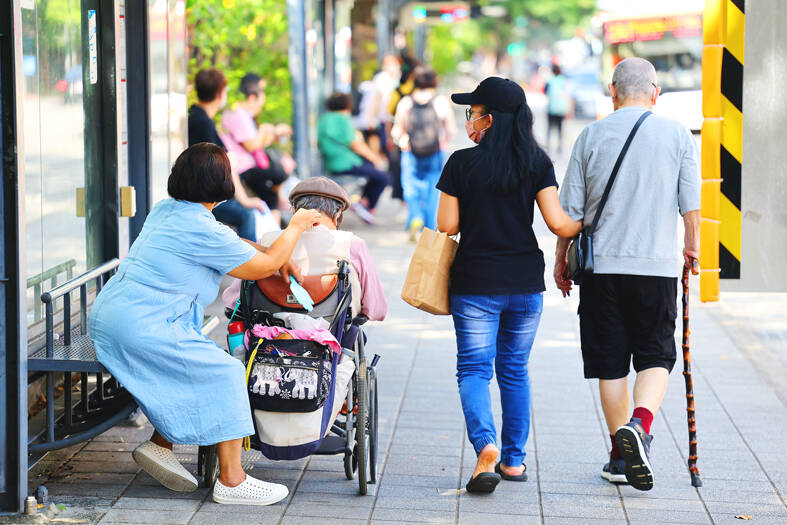The Ministry of Labor (MOL) on Thursday said it has officially launched a pilot program for dispatching foreign care workers to multiple households in one day, with the migrant caregivers potentially working up to 14 hours in a 24-hour period.
Under the new “Pilot Program for Diversified Companion Care Services” devised by the ministry, commercial and nonprofit organizations would be allowed to employ foreign care workers and dispatch them to multiple residences in a single day for a minimum of four hours at a time, the ministry said.
Under current rules, foreign care workers are generally employed on a live-in basis, residing with families that hire them to provide full-time care to someone in that household.

Photo: CNA
The pilot program launched on Thursday is aimed at offering greater flexibility for self-funded care, the ministry said.
“Applicants for the program must meet certain criteria, such as having a disability certificate, proof of a severe illness, post-surgery medical records, or being assessed as needing long-term care at levels 2 to 8,” said Su Yu-kuo (蘇裕國), head of the Cross-Border Workforce Management Division of the ministry’s Workforce Development Agency.
“The services provided may include providing basic daily care, accompanying them when going out, accompanying them to receive medical treatment, offering safe companionship, and so on,” Su said.
The minimum caregiving time for any migrant worker dispatched to a residence would be four hours, and if it is a 24-hour request, this “must include 10 hours of rest,” Su said.
Despite announcing the launch of the program, the ministry has not decided how much a household would pay for the labor of migrant care workers under the plan, nor provided any information on how much the care workers could earn.
“The service charges would be determined after [the potential commercial or nonprofit organizations] submit their plans, and a selection committee would evaluate them,” Su said.
The ministry yesterday held a briefing with more than 30 potential caregiver-dispatching organizations, saying the application to apply would be released soon.
The ministry expects that at least three commercial or nonprofit organizations in the northern, central and southern regions of the country would each hire about 10 foreign care workers in the first year of the program, Su said.
In August, the ministry’s program was criticized by lawmakers and non-governmental organizations as potentially undermining the domestic workforce, given that foreign migrant workers can legally be paid less than Taiwanese workers.
The monthly salary for live-in migrant caregivers and domestic helpers is NT$20,000, nearly a third lower than the minimum wage of NT$27,470 guaranteed to Taiwanese workers under the Labor Standards Act (勞動基準法).
As of the end of June, there were 241,532 foreign workers employed in caregiving or other social welfare functions, more than three-quarters of whom (77.2 percent) were from Indonesia, ministry data showed.

TRAFFIC SAFETY RULES: A positive result in a drug test would result in a two-year license suspension for the driver and vehicle, and a fine of up to NT$180,000 The Ministry of Transportation and Communications is to authorize police to conduct roadside saliva tests by the end of the year to deter people from driving while under the influence of narcotics, it said yesterday. The ministry last month unveiled a draft of amended regulations governing traffic safety rules and penalties, which included provisions empowering police to conduct mandatory saliva tests on drivers. While currently rules authorize police to use oral fluid testing kits for signs of drug use, they do not establish penalties for noncompliance or operating procedures for officers to follow, the ministry said. The proposed changes to the regulations require

The Executive Yuan yesterday announced that registration for a one-time universal NT$10,000 cash handout to help people in Taiwan survive US tariffs and inflation would start on Nov. 5, with payouts available as early as Nov. 12. Who is eligible for the handout? Registered Taiwanese nationals are eligible, including those born in Taiwan before April 30 next year with a birth certificate. Non-registered nationals with residence permits, foreign permanent residents and foreign spouses of Taiwanese citizens with residence permits also qualify for the handouts. For people who meet the eligibility requirements, but passed away between yesterday and April 30 next year, surviving family members

China Airlines Ltd (CAL) yesterday morning joined SkyTeam’s Aviation Challenge for the fourth time, operating a demonstration flight for “net zero carbon emissions” from Taiwan Taoyuan International Airport to Bangkok. The flight used sustainable aviation fuel (SAF) at a ratio of up to 40 percent, the highest proportion CAL has achieved to date, the nation’s largest carrier said. Since April, SAF has become available to Taiwanese international carriers at Taipei International Airport (Songshan airport), Kaohsiung International Airport and Taoyuan airport. In previous challenges, CAL operated “net zero carbon emission flights” to Singapore and Japan. At a ceremony at Taoyuan airport, China Airlines chief sustainability

‘ONE CHINA’: A statement that Berlin decides its own China policy did not seem to sit well with Beijing, which offered only one meeting with the German official German Minister for Foreign Affairs Johann Wadephul’s trip to China has been canceled, a spokesperson for his ministry said yesterday, amid rising tensions between the two nations, including over Taiwan. Wadephul had planned to address Chinese curbs on rare earths during his visit, but his comments about Berlin deciding on the “design” of its “one China” policy ahead of the trip appear to have rankled China. Asked about Wadephul’s comments, Chinese Ministry of Foreign Affairs spokesman Guo Jiakun (郭嘉昆) said the “one China principle” has “no room for any self-definition.” In the interview published on Thursday, Wadephul said he would urge China to